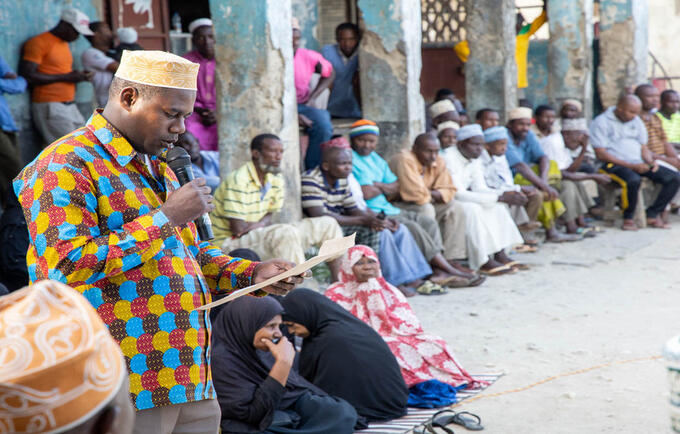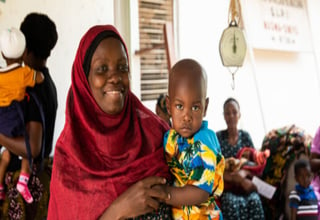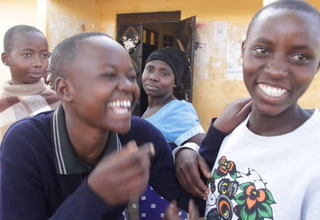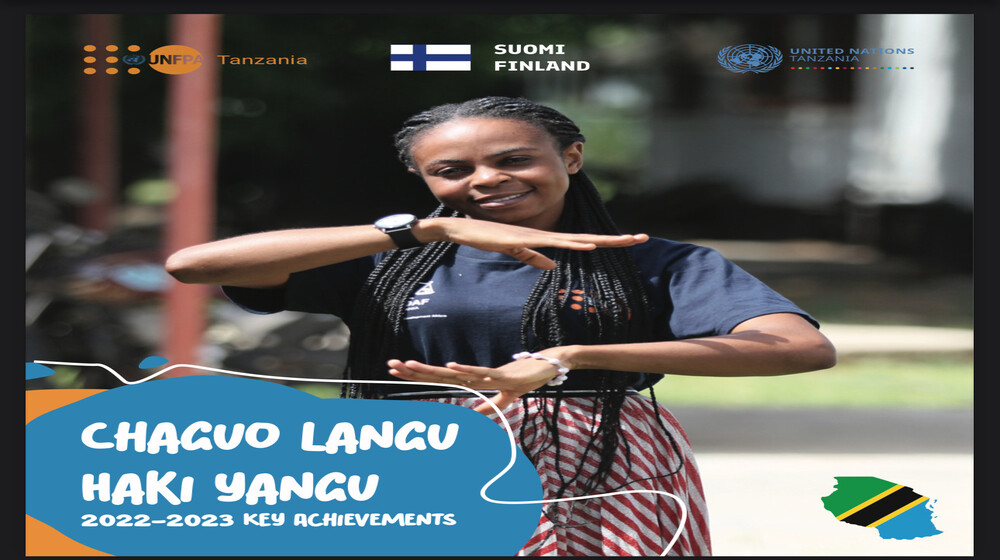A story from Ustadhat Hekima Maulidi of Kishapu District, Shinyanga Region.
The Chaguo Langu Haki Yangu (CLHY): My Choice My Right programme empowers faith leaders to participate in a movement to develop community-led solutions for social behaviour change to protect the Rights and Choices of Women and Girls, particularly Women and Girls with Disabilities in Tanzania. This initiative, funded by the Government of Finland and implemented by UNFPA in partnership with the Tanzania InterFaith Partnership in both Mainland Tanzania and Zanzibar, trains faith leaders to challenge negative social norms, including gender-based violence (GBV), child marriage, and female genital mutilation (FGM), while promoting positive alternatives.
Utilizing religious leaders’ pocketbooks titled, 'Nafasi ya Imani katika kuleta Mabadiliko'' translated as “The role of faith in bringing about change'', published in both Muslim and Christian versions, the training equips faith leaders with tools to challenge negative social norms of masculinity, gender stereotypes and discrimination while promoting positive ones that include denormalising GBV, child marriage and FGM, including through countering distorted religious references to justify them. The pocketbooks explain what GBV, child marriage and FGM are, their root causes, drivers, consequences and detrimental effects on women and girls' lives. They also provide information about approaches to identifying and reporting on GBV, child marriage and FGM.
Using the pocketbooks and information shared during the training, the faith leaders developed action plans that outlined their commitments to disseminate anti-GBV and harmful practices messages within their communities. These plans include utilizing platforms such as Sunday and Friday prayers, religious schools, and marriage ceremonies to influence positive social behaviour change. The aim is to disseminate the anti-GBV and harmful practices message to their believers for effective, positive and transformative social behaviour change.
After participating in the training, one of the trained faith leaders in Kishapu district, Ustadhat Hekima Maulidi, successfully intervened to end the marriage of a child. After hearing the news of the child marriage involving Claudia Hamsini, she consulted her colleague, Fadhili Daniel, who also received the CLHY-supported training.
Claudia, the survivor of child marriage who lives with her mother, Waridi Simon, was approached by various boys and men from the community (of marrying age) proposing to marry her. Claudia refused to get married because she felt she was still young and wanted to continue her education. As a result of rejecting the marriage proposals, KUTULIJWA, a sanction or practice of isolating a person/family from the rest of the community for non-compliance to the community demands held as social norms, was imposed on Claudia. The right for a girl to say no to such marriage proposals is not respected in her community; hence, the heavy penalty of KUTULIJWA was a way of sending a strong message to other girls who might want to follow her courage.
Through mediation, Ustadhat Hekima and Fadhili Daniel persuaded community members and elders to reject Claudia's isolation sanction, highlighting the rights of children and the importance of girls' autonomy in marriage decisions. The faith leaders managed to reverse the KUTULIJWA, and Claudia could continue with her education. They also shared their experience with other faith leaders to strengthen their collective efforts against child marriage and community sanctions perpetuating the practice.
Reflecting on the initiative, Ustadhat Hekima praised the training the faith leaders received, saying,
“The training was informative and empowered faith leaders to tackle GBV, child marriage, and FGM in our community.”
Ustadh Fadhili echoed this sentiment, emphasizing the program's role in revitalizing their commitment to ending violence against women and children
“We have been condemning such practices, but the program has refreshed our knowledge and determination and provided a useful pocketbook to strengthen our fight to end violence against women and violence against children.”
Both faith leaders have committed to promoting faith-based institutions’ collaboration with relevant sectors, including the Social Welfare department, police gender desk, and paralegals, to strengthen the multi-sectoral approach to end child marriage, GBV and FGM.
Note to the Editor:
KUTULIJWA is a sanction, or practice of isolating a person/family from the rest of the community for non-compliance to the community demands held as social norms. As a result the person/whole family is disregarded, ignored and snubbed in all community engagements as a punishment and lesson to other community members to attempt a similar resistance. This punishment can be used to perpetuate gender inequalities including child marriage
About Chaguo Langu, Haki Yangu project
Chaguo Langu Haki Yangu - ‘My Rights My Choices’ is a three-and-a-half-year programme (2021-2025) implemented by UNFPA, the United Nations Sexual and Reproductive Health agency, with funding from the Government of Finland. The programme’s goals are to ensure that the rights and choices of women and girls, particularly women and girls with disabilities, are protected and enhanced through a multi-sectoral and holistic response that tackles gender-based violence and harmful practices, including teenage pregnancy, child marriage and female genital mutilation. The programme is implemented as part of activities to realise the National Plans of Action to End Violence Against Women and Children (NPA-VAWC) in Mainland Tanzania (2016/17-2021/22) and Zanzibar (2017-2022).
Direct beneficiaries: Adolescent girls and young women, particularly women and girls with disabilities, living in Shinyanga (Kishapu and Kahama districts) and Mara Regions (Tarime and Butiama districts) and Zanzibar (Urban district in Unguja and Chake Chake district in Pemba) who are vulnerable to or survivors of GBV, FGM and early and child marriage.
Indirect beneficiaries: Affected families, targeted communities and government institutions whose capacities will be strengthened to prevent and respond to gender-based violence and harmful practices, including teenage pregnancy, child marriage and female genital mutilation, and to uphold the rights of women and girls, particularly women and girls with disabilities.
The programme enhances coordination, knowledge-sharing, and policy development to support the implementation of the NPA-VAWC in Mainland Tanzania and Zanzibar in collaboration with the Government of the United Republic of Tanzania, including local government authorities.




